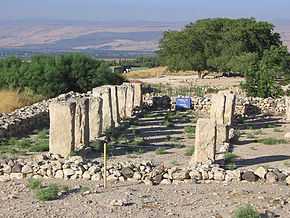Tel Hazor
| תל חצור | |

House of Pillars at Hazor
|
|
| Location | Tell el-Qedah, Israel |
|---|---|
| Region | Upper Galilee |
| Coordinates | 33°1′0″N 35°34′1″E / 33.01667°N 35.56694°ECoordinates: 33°1′0″N 35°34′1″E / 33.01667°N 35.56694°E |
| Type | Settlement |
| History | |
| Abandoned | 732 BC |
| Official name | Biblical Tells – Megiddo, Hazor, Beer Sheba |
| Type | Cultural |
| Criteria | ii, iii, iv, vi |
| Designated | 2005 (29th session) |
| Reference no. | 1108 |
| State Party | Israel |
| Region | Asia-Pacific |
Tel Hazor (Hebrew: תל חצור), also Hatzor (חצור) and Tell el-Qedah (Arabic: تل القضاه), is an archaeological tell at the site of ancient Hazor, located in the Upper Galilee, north of the Sea of Galilee, in the southern Hula Valley overlooking Lake Merom. In the Middle Bronze Age (around 1750 BC) and the Israelite period (ninth century BC), Hazor was the largest fortified city in the country and one of the most important in the Fertile Crescent. It maintained commercial ties with Babylon and Syria, and imported large quantities of tin for the bronze industry. In the Book of Joshua, Hazor is described as “the head of all those kingdoms” (Josh. 11:10).
The Hazor expedition headed by Yigal Yadin in the mid-1950s was the most important dig undertaken by Israel in its early years of statehood. Tel Hazor is the largest archaeological site in northern Israel, featuring an upper tell of 30 acres and a lower city of more than 175 acres.
In 2005, the remains of Hazor were designated a World Heritage Site by UNESCO as part of the Biblical Tels - Megiddo, Hazor, Beer Sheba.
During the Egyptian Second Intermediate Period and early New Kingdoms (together running between 18th century BC and 13th century BC), Canaan was an Egyptian vassal state; thus 14th century documents, from the El Amarna archive in Egypt, describe the king of Hazor (in Amarna letters called Hasura), Abdi-Tirshi, as swearing loyalty to the Egyptian pharaoh. However, EA 148 specifically reports that Hasura's king had gone over to the Habiru, who were invading Canaan. In these documents, Hazor is described as an important city in Canaan. Hazor is also mentioned in the Execration texts, that pre-date the Amarna letters, and in 18th century BC documents found in Mari on the Euphrates River.
...
Wikipedia

